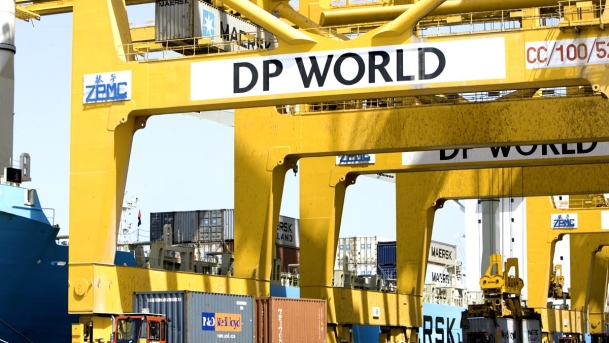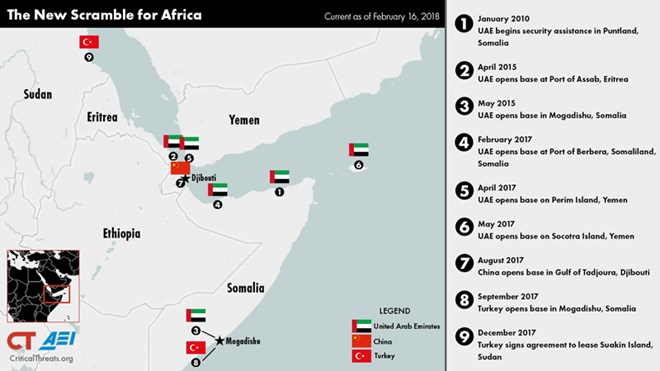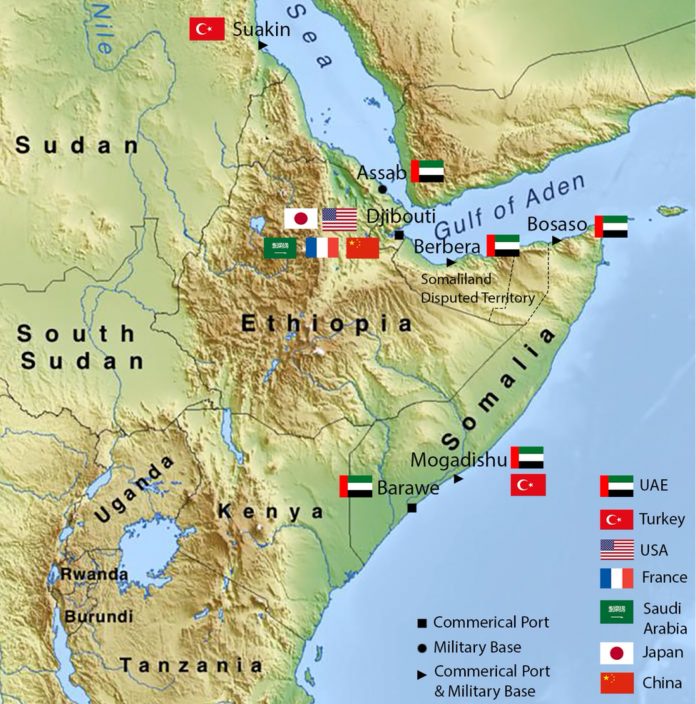
Arab Gulf countries have been interested in joining international actors that have strategized their influential in the Horn of Africa. For instance, the United Arab Emirates and Saudi Arabia have been solidified their political, economic and military activities in the region over the last two years. However, the Emirati pursuit of controlling certain strategic ports in the Horn of Africa, particularly in Somalia and Djibouti, has faced, in recent months, tough reactions from local countries. Even though the region has become an area where many countries implement their foreign policy goals, there are also other dynamics such as political, economic, cultural and religious that have played a great role in external players’ motivations. Another newly emerged instrument of influence is the military bases. China, Russia, Turkey and the United Arab Emirates have established military bases in the Horn of Africa with different motivations. The regional governments have cautiously welcomed these developments.
The Horn of Africa region has been the scene of continuing struggles of foreign actors throughout history. The centuries-long Ottoman influence in this region has left its place to the colonial activities of the Western countries. The region had witnessed the competition for the influence of the Soviet block with the West during the Cold War era. In recent years, number of new actors such as Turkey, the United Arab Emirates, and China has started to seek influence in the region. While China and Russia have developed significant economic activities in the region, Turkey has been utilizing its historical ties as well as humanitarian aids in Somalia and other countries in the region.
The region has been lying in the shores of Gulf of Aden, Bab al-Mandab, and the Red Sea, a route that is one of the most important passages for world maritime trade. Bab al-Mandab is particularly important for Asian trade giants such as China and Japan that exports significant amount of goods to Europe through this route. In addition, a great deal of the oil and natural gas exports from the Gulf countries to the European market are shipped through the Gulf of Aden, Bab al-Mandab, and the Red Sea route. Therefore, for many countries, the stability of this region is of great importance.
The region is important also since it is considered to be one of the most important entry points to the African market by the leading countries of Asia and the Middle East. This is indicative of China's investment in Ethiopia and Russia's efforts to develop closer economic and political relations with regional countries such as Eritrea and Djibouti. Another country that closely follows the region, in this sense, is the United Arab Emirates. Two UAE economic giants, Abu Dhabi and Dubai, export significant amount of goods to Africa. The two Emirates also serve as a hub for other countries and international companies that seek business with the continent. This makes the Emirati ports as a crucial transfer point for big companies that export their goods to Africa. While global firms, including Nestle, use Dubai as the hub of African operations, thousands of containers leaving China and India for Africa arrive at the port of Dubai to be transferred to Africa. This trend has derived from the increasing volume of trade, particularly from Dubai to Africa, over the years. Between 2008 and 2013, non-oil trade from Dubai to Africa increased by 700 percent. (1)
 |
| Easter African Ports [AEI] |
The increasing capacity and technology of the ports in countries like Djibouti and Somalia threaten the importance of UAE ports that give the country the strategic advantage. Concerned about the diminishing importance of Dubai port as a regional headquarter for many global companies, the UAE remains sceptical about the fact that ports in countries, such as Djibouti, Kenya, and Tanzania, have rapidly increased their capacity. Their growth has triggered the Emirati interest in operating several ports in the region with the aim of keeping their volume constrained at a certain level.
The strategy of global and regional powers calls for spreading their influence into a wider geography in the region through the construction of military bases. Turkey has established its largest military base abroad in Mogadishu, the capital of Somalia. Djibouti has hosted military bases of global players such as the United States, France, and Italy. China and Russia have also considered establishing military bases in Djibouti and Eritrea. Another country that follows an aggressive strategy in this regard is the United Arab Emirates. It has recently sought new military bases in the semi-autonomous regions of Somalia, namely Somaliland and Puntland, and in the port city of Assab in Eritrea. (2) However since February 2018, Emirati activities have been faced with some resistance of the local governments, particularly in Somalia and Djibouti. The subsequent diverging political objectives have led to a crisis environment between these two countries and the UAE.
The region’s geographical proximity to Africa's most populous countries represents another important element of its significance with over 200 million individuals. Besides the less populated countries such as Somalia, Djibouti, and Eritrea, the region hosts or neighbours countries like Egypt, Tanzania, Uganda, Ethiopia, Sudan, and Kenya with sizable populations. Most international actors consider this region as a potential power base in securing their interests in global politics. Therefore, countries like China, Russia, United Arab Emirates, and Turkey have tried to develop good relations with the Horn of Africa states.
From a comparative approach, The United Arab Emirates has been most aggressive in advancing its policy in the region in line with four main motives: a) to control maritime movement through Bab al-Mandab Strait; b) to assume a major role in operating the local ports in the region, which represent lifelines for the Horn of Africa; c) UAE's regional rivals and competition with Turkey and Qatar, which have well-positioned their businesses in the region; and d) the Emiratis have favoured a proxy role vis-à-vis the policies of their allies, notably the United States and Israel.
Foreign Actors and Local Reactions
For a decade now, the Emirati interest has deepened in the Horn of Africa region. The UAE has been involved in solving the piracy crisis in Somalia, and provided Mogadishu with humanitarian aid. In 2006, Abu Dhabi signed an agreement with Djibouti to operate Doraleh, one of the most important ports in the region. While longing to establish a military base at the port of Assab in Eritrea, the UAE government has also sought to develop good relations with Ethiopia. Some governments have been reluctant in deepening the cooperation with the UAE following their unease with ambiguity in the motivations of the UAE’s regional policy. In short, Somalia and Djibouti have recently soured relations with the UAE, criticising Abu Dhabi for pursuing an interventionist policy. Examples of these strained relations can be seen in the recent political crisis between the Emirates and two important countries of the region, Somalia and Djibouti. (3)
1. Military Base Crisis with Somalia
The relations between Mogadishu and Abu Dhabi have faced new challenges since the Presidential election in Somalia in 2017. Former President Hassan Sheikh Mahmoud, who came to power in 2012, had close relations with the Emirati leadership. During his presidency, the bilateral economic and military relations increased. Abu Dhabi has also made strategic moves to become an influential actor in the country. It used two main instruments: control of ports operations and and the establishment of military bases. The semi-autonomous regions of Somaliland and Puntland welcomed the Emirati initiative and allowed the UAE military to operate in these regions.
However, the bilateral relations have taken a downturn following the 2017 presidential election. Mohamed Abdullahi Mohamed, known as Fermacu, was elected as new president of Somalia, while maintaining the support of Turkey and Qatar. He was quick to criticize the activities of the UAE in Somalia and claimed that Abu Dhabi does not respect the national sovereignty of his country. Abdullahi also announced his government would prevent Emirati activities if Abu Dhabi continues to violate Somalia’s national sovereignty.
After the eruption of the Gulf crisis between the Quartet [UAE, Saudi Arabia, Bahrain, and Egypt] and Qatar, the Emirati leadership asked Somalia to support the political blockade of Qatar. Mogadishu declined the request and announced its neutrality in the crisis. Given its long-term investments in the country, UAE was upset with the decision of Somalia and became hostile to the government in Mogadishu. (4)
The UAE-Somalia souring relations have left a spillover effect, while expanding the Gulf crisis into remote areas. The Somalia government explicitly expressed its discomfort with the existence of the military bases in Somaliland and Puntland regions. Mogadishu argued that the Emirati activities have undermined its national unity as they have supported the regional administrations that have called for independence. Some observers have pointed that Abu Dhabi has not only attempted to establish military bases in these regions, but also provided financial and military support for certain political actors and armed groups in the region.
Mogadishu remained concerned with the Emirati increasing control of the port of Berbera in Somaliland and port of Bossaso in Puntland region. Consequently, Mogadishu has decided to stop the UAE’s activities by the decision of the Somali parliament, in March 2018, to adopt a law that has called for the termination of all Emirati economic and military activities throughout the country. (6)
Since April 2018, the UAE-Somalia crisis has deepened after Somalia seized a UAE-owned plane, which was illegally carrying around 10 million U.S. dollars in cash to the country. (7) The Somali government argued that the money was planned to be handed to the groups in Somaliland and Puntland. Certain allegations pointed to the fact that the money would be used in certain operations to destabilize the country in order to weaken the Fermacu leadership. The UAE, however, argued that the claims regarding the aircraft did not reflect reality; and that the money was going to be used within the framework of the Somali army soldiers training program. (8)
The UAE decided to retaliate by halting most of its humanitarian work in the region.
Abu Dhabi closed the Sheikh Zayed hospital, which was built in Somalia to provide free medical care for low-income citizens. (9) Abu Dhabi also decided to suspend a military program that started in 2014 to train Somalia security forces. (10) The new rift between Somalia and the UAE is most likely going to deepen over time while the Emirati support continues for the regional administrations in Somaliland and Puntland.
 |
| Existing foreign Military bases in the Horn of Africa [Getty Images] |
2. Port Crisis with Djibouti
Djibouti and the UAE maintained close economic cooperation after the UAE-based DP World’s agreement with the Djibouti government to operate Doraleh port, the most important trade hub of the country. However, the relations started to deteriorate over a new disagreement. (11) In 2014, Djibouti government launched an arbitration proceeding against DP World amidst suspicion of bribery. Djibouti government argued that, in the process of signing the agreement, DP World bribed some of the government officials; so, they would favor the company over Djibouti. It is also noteworthy that DP World has been mismanaging the port, and causing financial damages to the country. (12)
While the arbitration proceeds, DP World continues to operate the Doraleh port. After three years, the arbitration board in London decided in 2017 that DP World has been cleared of all charges over its operation of the Doraleh port in Djibouti. The government of Djibouti rejected the decision of the arbitration and announced that it would take further actions. (13)
Djibouti was not satisfied because the DP World’s had been operating the Doraleh port with less than 50 percent of its full capacity. It also argued that DP World’s main motivation to keep Doraleh port at the lowest capacity was to sustain the maximum level of activity at the Dubai port, the leading location of maritime transport in the region. The Djibouti government also claimed that the deal with DP World in 2006 was in contrast with the national interests due to malpractices of Djibouti officials involved at that time, and this was the main reason for the cancellation of the agreement. (14)
Consequently, Djibouti President Ismail Omar Guelleh announced his decision “to proceed with the unilateral termination with immediate effect of the concession contract awarded to DP World”, and that “all activities of the company have also been terminated. (15) Following this announcement, Djibouti security forces seized the Doraleh port. (16)
End of an Affair?
Two odds have stood in the way of the UAE’s foreign policy: a) contestation of
Emirati aggressive policies by local governments in the Horn of Africa; b) correlation between its interventions in regional conflicts such as Yemen, Libya, Egypt and Libya and the deepening security and political crises. Somalia and Djibouti have decided to re-evaluate their relations with the UAE to help avoid instability in their neighbourhood.
Another reason for Djibouti and Somalia’s decision to sever relations with the UAE is the increasing involvement of other global and regional actors in the Horn of Africa region. Countries like Turkey, China and Russia are seeking opportunities to cooperate with Eastern African countries. Turkey has inaugurated its largest military base abroad in Somalia, and is establishing a free trade zone in Djibouti.
One can argue that the Horn of Africa will continue to trigger strategic competition between regional and global actors. These Eastern African countries, which have a politically fragile structure but are aware that they have a strategic importance, have become more experienced in integrating themselves into the multi-polar international system.
1) Afshin Molavi, The Emerging Dubai Gateway to Africa, John Hopkins School of Advanced International Studies – Foreign Policy Institute, 9 October 2014, https://www.fpi.sais-jhu.edu/single-post/2014/10/09/The-Emerging-Dubai-Gateway-to-Africa; Simeaon Kerr, Dubai becomes centre for Mideast-Africa trade, Financial Times, 25 November 2013, https://www.ft.com/content/30fb31dc-37d6-11e3-8668-00144feab7de
2) Ismail N. Telci and Tuba Öztürk Horoz, Military Bases in the Foreign Policy of the United Arab Emirates, Insight Turkey, Vol. 20 / No. 2 / 2018, pp. 143-165.
3) Ismail N. Telci, From Cooperation to Conflict: the UAE’s Deepening Crisis with Somalia and Djibouti, The New Turkey, 26 April 2018, https://thenewturkey.org/from-cooperation-to-conflict-the-uaes-deepening-crisis-with-somalia-and-djibouti/
4) Gulf crisis spills into Somalia as tensions with UAE soar, The East African, 13 April 2018, http://www.theeastafrican.co.ke/news/Gulf-crisis-spills-into-Somalia-as-tensions-with-UAE-soar--/2558-4392152-13bqj36/index.html
5) Robert Anderson, Dubai’s P&O Ports wins 30-year concession in Somalia’s Puntland, Gulf Business, 6 April 2017, http://gulfbusiness.com/dubais-po-ports-wins-30-year-concession-somalias-puntland/
6) Somalia passes law banning UAE port, Emirates continues work, Middle East Monitor, 15 March 2018, https://www.middleeastmonitor.com/20180315-somalia-passes-law-banning-uae-port-emirates-continues-work/
7) Somalia: Govt Forces ‘intercept cash from UAE’ at Mogadishu Airport”, Garowe Online, 9 April 2018, https://www.garoweonline.com/en/news/somalia/somalia-govt-forces-intercept-cash-from-uae-at-mogadishu-airport
8) UAE condemns seizure of private jet and funds by Somali authorities, United Arab Emirates, Ministry of Foreign Affairs and International Cooperation, 10 April 2018, https://www.mofa.gov.ae/EN/MediaCenter/News/Pages/10-04-2018-UAE-Somalia.aspx
9) UAE shuts Mogadishu hospital amid tension with Somali government, Al Jazeera, 17 April 2018, https://www.aljazeera.com/news/2018/04/uae-shuts-mogadishu-hospital-tension-somali-government-180417120421254.html
10) After attack, UAE to end Somalia military training mission, Fox News, 16 April 2018, http://www.foxnews.com/world/2018/04/16/after-attack-uae-to-end-somalia-military-training-mission.html
11) Asteris Huliaras and Sophia Kalantzakos, The Gulf States and the Horn of Africa: a New Hinterland?, Middle East Policy, Vol. XXiV, No. 4, WiNter 2017p.67.
12) Djibouti in legal dispute with DP World over port concession, Reuters, 8 July 2014, https://af.reuters.com/article/idAFL6N0PJ4FP20140708
13) Simeon Kerr and John Aglionby, DP World wins tribunal case against Djibouti over bribe case, Financial Times, 21 February 2017, https://www.ft.com/content/9bca1468-f837-11e6-9516-2d969e0d3b65
14) Ismail N. Telci, From Cooperation to Conflict: the UAE’s Deepening Crisis with Somalia and Djibouti, The New Turkey, 26 April 2018, https://thenewturkey.org/from-cooperation-to-conflict-the-uaes-deepening-crisis-with-somalia-and-djibouti/
15) Djibouti ends Dubai's DP World contract to run container terminal, Reuters, 22 February 2018, https://www.reuters.com/article/us-djibouti-ports-dp-world/djibouti-ends-dubais-dp-world-contract-to-run-container-terminal-idUSKCN1G62HE
16) UAE says Djibouti government illegally seizes DP World port, Al Arabiya, 23 February 2018, https://english.alarabiya.net/en/business/aviation-and-transport/2018/02/23/UAE-says-Djibouti-govenrment-illegally-seizes-DP-World-port-.html
